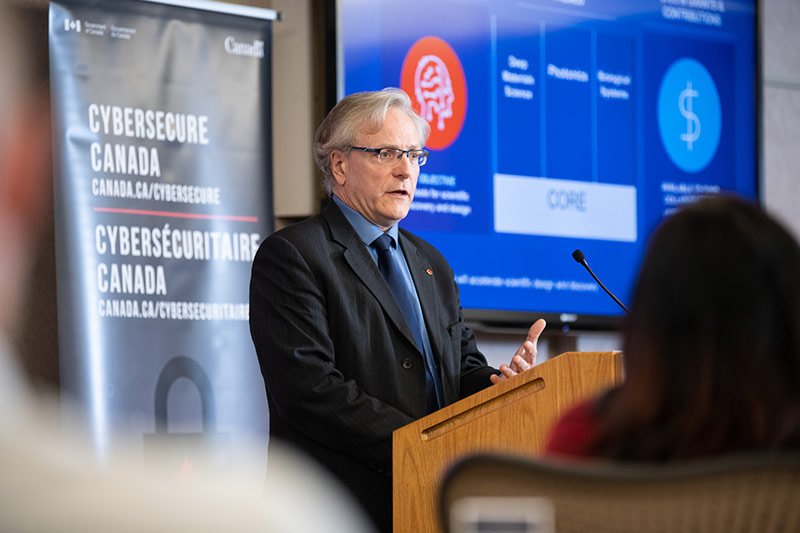Dr. Joel Martin helps UNB uncover the challenges and opportunities of a digital world
Author: UNB Newsroom
Posted on Nov 29, 2022
Category: UNB Saint John , UNB Fredericton

The University of New Brunswick (UNB), in collaboration with Innovation, Science and Economic Development (ISED) Canada, recently welcomed Dr. Joel Martin, the Chief Digital Research Officer and Chief Science Officer for the National Research Council of Canada (NRC), back to the Fredericton campus.
As the person tasked with promoting digital transformation across all areas of research in Canada, Martin has been a large part of the successful partnership between UNB and the NRC. The event served to build research and development opportunities in areas that align with the priorities recognized by the Government of Canada and to promote active discussion on addressing key challenges.
UNB hosts an NRC building on its Fredericton campus, and researchers from both organizations often serve as co-principal investigators on projects. Together UNB, NRC and partners are excelling at developing technology, tools and policies to respond to many of the NRC’s Challenge programs Aging in Place, Pandemic Response, Artificial Intelligence (AI) for Design, Materials for Clean Fuels and Internet of Things: Quantum Sensors. Martin joins UNB researchers in maintaining strong partnerships, enhanced by in-person events that help create and strengthen relationships.
Martin has presented at two UNB events in the past three months. He was a speaker at Canadian Institute for Cybersecurity’s Privacy, Security and Trust conference in August and was the keynote speaker at an Oct. 31 event focused on bringing universities, industry and government together to discuss two of the most pressing challenges facing Canada today – digitization and climate change.
During the Oct. 31 event, Dr. Martin highlighted the importance of AI and the need for cybersecurity to be considered in all aspects of digital technology. He said the potential of AI applies across all areas of human endeavour – autonomous vehicles, sales analysis, scientific research and many others. “AI is taking us to a future where people can focus on the most challenging aspects of problems while computers perform very effective execution of the more repetitive tasks.”
Martin also discussed how using AI can impact multiple sectors using the examples of questions on how to structure insurance policies for autonomous vehicles and secure the personal data collected by healthcare devices. He foresees a need for research and innovation around the legal and privacy impacts of AI innovation.
While Martin’s job focuses on keeping Canadian researchers at the forefront of digital innovation, he approaches his job with a pragmatic view of both good and bad possibilities for using AI. When asked what keeps him up at night, he replied, “The fear of moving too quickly and causing a major social problem.”
Like many people, Martin’s academic career included a pivot. He studied psychology and human intelligence in his early academic career and then pursued an M.Sc. and PhD in computer science and turned his focus from human to machine learning. After completing postdoctoral studies at the University of Pittsburgh, Martin joined the NRC to work on machine learning projects. He has been contributing his talents to keeping Canada and universities, such as UNB, innovating in a digital world ever since.
